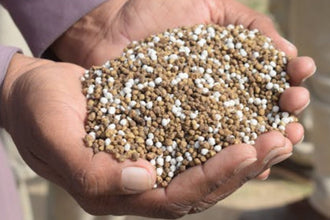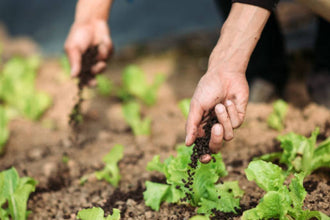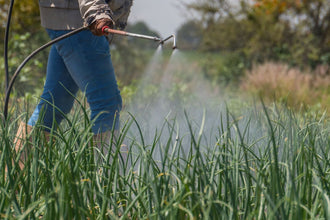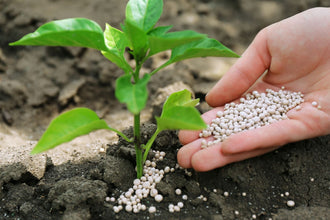When it comes to nourishing plants, organic fertilizers are a popular choice. These fertilizers are derived from natural materials, which include animal waste, compost, and other variants. Comparing organic fertilizers is vital to understanding their efficiency, environmental impacts, and suitability for various plants.
Benefits of Organic Fertilizer
Organic fertilizers represent a sustainable and eco-friendly approach to plant nourishment. Here are a few key benefits of using them:
- Rich in Various Nutrients: Organic fertilizers are packed with a host of necessary nutrients like nitrogen, phosphorus, and potassium, enhancing plant health and productivity.
- Improved Soil Structure: They significantly improve soil structure by boosting its ability to hold onto water and nutrients, enabling plants to develop healthy root systems.
- Slow Release of Nutrients: The slow and steady release of nutrients reduces the risk of over-fertilization, a concern often linked with synthetic fertilizers.
- Promotes Microbial Activity: Organic fertilizers support and stimulate beneficial soil microorganisms, which in turn make the soil fertile and healthy.
- Ecological Balance: These fertilizers are made from naturally occurring materials, leaving a minimal environmental footprint. They contribute to maintaining ecological balance and biodiversity.
- Reduced Soil Erosion: Organic fertilizers can enhance the soil’s capacity to prevent erosion by improving its structure, thereby preserving valuable topsoil.
- Improved Water Retention: The use of organic fertilizers can increase the soil's ability to retain water, making it more resilient to drought conditions and ensuring plants stay hydrated.
- Increased Yield: Although the nutrient release is slower, the long-term use of organic fertilizers can lead to an increased yield over time compared to the use of synthetic fertilizers.
By considering these benefits, it's clear that organic fertilizers hold significant potential for maintaining our soil's health while also promoting sustainable farming.
Animal Waste
Animal waste, also known as manure, is a widely-used organic fertilizer that comes from various animals, such as poultry, cows, and horses. It provides numerous benefits for the soil, but it is essential to consider certain drawbacks as well.
Pros and Cons
Pros:
- Rich in Nutrients: Manure is packed with essential nutrients like nitrogen, phosphorus, potassium, and other micronutrients, which promote healthy plant growth and improve overall soil fertility.
- Enhances Soil Structure: Adding animal waste to the soil improves its structure by increasing water retention, aeration, and nutrient-holding capacity.
- Cost-effective: Animal waste is often more affordable compared to synthetic fertilizers, making it a viable option for many gardeners and farmers.
Cons:
- Pathogens and Weed Seeds: Manure can sometimes contain harmful pathogens like E. coli and weed seeds, which may introduce infections or invasive plants to your garden.
- Environmental Concerns: The use of animal waste as fertilizer can raise environmental concerns, particularly regarding biological threats from pathogens that may be present in manures, and excesses that may be present around larger farms.
- Application and Handling: The proper handling, storage, and application of animal waste are essential to minimize the risk of contamination and odor nuisances.
Suitable Uses
Considering its rich nutrient content, animal waste is a suitable organic fertilizer for various applications. Some suitable uses include:
- Garden Soils Improvement: Gardeners can work animal waste into garden soils during the year to replenish nutrients, enhance soil structure, and boost overall garden health.
- Vegetable Farming: Manure can provide essential nutrients for vegetable farming, making it ideal for growing bountiful harvests that are both healthy and flavorful.
- Composting: Adding animal waste to compost piles can accelerate the decomposition process and produce high-quality compost rich in nutrients, which can then be used to feed plants and improve soil health.
Animal waste can be an effective and affordable organic fertilizer option. However, proper handling and awareness of potential drawbacks are crucial to ensure the health safety of both the environment and individuals.
For safe and effective manure-based fertilizer, trust Fancy Chicken. It is made from organic chicken manure, manufactured in the highest quality possible ensuring pathogen-free content, promoting environmental safety, and providing user-friendly application guidance. This makes it a superior choice for organic gardening—yielding a thriving, healthy, and productive garden with every use.
Compost
Compost is a valuable organic fertilizer that consists of decomposed organic matter derived from various plant and kitchen waste materials. It offers many benefits to soil and plants, but there are also some drawbacks to consider.
Pros and Cons
Pros:
- Improves Soil Health: The addition of compost to garden soil enhances its properties, including texture, structure, and nutrient-holding capacity.
- Boosts Water Retention: Compost improves the soil's ability to hold onto water, ensuring that plants stay hydrated and promoting their overall health.
- Sustains Beneficial Soil Organisms: By nurturing an environment rich in microorganisms, compost supports the growth of beneficial fungi, bacteria, and other organisms that help break down organic matter and contribute to overall soil fertility.
Cons:
- Variable Nutrient Content: The nutrient content of compost can vary greatly, depending on the materials used and the composting method employed. This inconsistency can make it challenging to predict the precise nutritional effects on the soil.
- Long Decomposition Time: Decomposition of compost can be slow, and it may take several months for the organic matter to break down completely and release nutrients into the soil.
Suitable Uses
Given its versatile benefits, compost is well-suited for numerous gardening and agricultural applications:
- Enriching Garden Soil: Compost can be mixed into garden soil to boost overall fertility, improving soil structure and promoting healthier plant growth.
- Growing a Diverse Range of Plants: The wide array of nutrients present in compost makes it suitable for growing various plants, including flowers, vegetables, and shrubs.
- Mature Plant Maintenance: Regular application of compost to the base of established plants can provide a slow-release source of nutrients, helping maintain the health and vigor of mature plants.
Compost is a vital resource for enriching soil, promoting healthier plant growth, and supporting more sustainable agricultural practices. Understanding its benefits and limitations is critical for maximizing its potential in various gardening and farming applications.
Other Types of Organic Fertilizers
Besides compost and animal waste, there are various other forms of organic fertilizers like green manures, crop residues, and wood ashes. Each offers unique pros and cons.
Pros and Cons
Pros:
- Micronutrient Enhancement: These organic fertilizers are a valuable source of diverse micronutrients that are essential for plant growth and development.
- Soil Improvement: They can significantly improve soil structure and fertility, promoting healthier and more productive plants.
- Environmentally Friendly: Unlike synthetic fertilizers, they are made from natural and often renewable resources, reducing environmental impact.
Cons:
- Long Decomposition Time: Similar to compost, these materials might take a longer time to decompose completely, which results in slower nutrient release.
- Nutrient Variability: Depending on their source, the nutrient content can vary, making it challenging to ensure consistent nutrient application.
Suitable Uses
Given their ability to add a variety of micronutrients and improve soil health, these organic fertilizers are useful in a range of agricultural and gardening contexts:
- Improving General Soil Fertility: Applying these organic fertilizers can enhance overall soil fertility by adding a variety of both macro and micronutrients.
- Adjusting Soil pH: Wood ashes can help in adjusting the soil pH, particularly in acidic soils, which increases the soil's ability to provide nutrients to the plants.
- Crop Rotation Schemes: Green manures in crop rotation schemes can help replenish nutrients in the soil, improving the soil's health for succeeding plantings.
Green manures, crop residues, and wood ashes can serve as sustainable alternatives to synthetic fertilizers. Their varied nutrient profiles and soil enhancement capabilities make them applicable in numerous farming and gardening scenarios to promote healthy plant growth and sustainable practices.
Comparison
Organic fertilizers differ in their nutrient content, availability, ease of use, and environmental impact. A comparison among different types can provide a clearer understanding.
Nutrient Content: In terms of nutrient content, animal waste generally has the highest levels, notably of nitrogen, phosphorus, and potassium. However, other organic fertilizers like compost and green manures also offer a diverse range of nutrients, although they may not be as concentrated.
Availability and Ease of Use: When considering availability and ease of use, compost typically ranks high. It can be easily produced at home from kitchen and garden waste, making it readily available and straightforward to use. On the other hand, while animal waste is available from farms, there are concerns about pathogen and contaminant levels that may require additional processing or careful handling.
Environmental Impact: All organic fertilizers contribute positively to the environment by reducing reliance on synthetic alternatives, improving soil health, and recycling waste. However, they are not without an environmental cost. The production and transport of animal manure, for instance, can have significant environmental costs due to greenhouse gas emissions and potential water contamination issues. Additionally, the farming practices associated with obtaining animal waste can raise issues connected to animal welfare.
Conclusion
Each type of organic fertilizer has unique benefits, and the choice depends on your requirements. Animal waste provides a high nutrient content, compost is easy to produce and use, and green manures contribute a variety of micronutrients.
Your gardening needs will dictate the right type, but combining them can also yield superior results. Whether your priority is high nutrient content, ease of use, or environmental impact, there's an organic fertilizer fit for your needs.
Considering various use cases, animal waste as fertilizer in the form of Fancy Chicken pelletized chicken manure, can be recommended for nutrient-demanding crops, compost for home gardens, and green manures for soil enhancement. The key is to understand the specific needs of your plants and soil, then make an informed decision regarding the best organic fertilizers to use.








